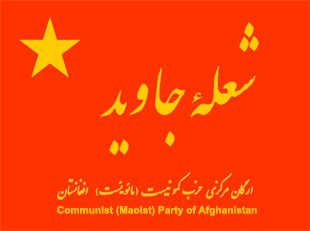The Communist (Maoist) Party of Afghanistan has announced that it will wage war against the imperialist occupiers in Afghanistan, as well as reactionary theocratic Islamists.
It seems as though the Taleban and jihadists fighting in Afghanistan will have new partners in their war on NATO and the West judging by the announcement that the Communist (Maoist) Party of Afghanistan released on July 15, 2010.
The Party stated: “We are in the process of preparing for a people’s war in Afghanistan, a war against the imperialist occupiers of our country.” The announcement was released on the website of Shola Jawid (Eternal Flame), an organ of the party, in memory of their Comrade Azad, a well-known spokesperson for the Indian “Naxalite” Maoists who was killed on July 1st.
The Communist (Maoist) Party of Afghanistan, a clandestine organization, is fruit of the reunification and revitalization of Maoist movements of the 60s and 70s, movements that had been shut down by Soviet communists and communists wishing to integrate with American communism. The foundations for the organization were set at the time the allied invasion in 2001, when it became clear that armed resistance against imperialism was necessary.
“If the Afghan masses continue to think that the only choice they have is between submission to foreign occupiers and submission to the Taleban and Al-Qaeda, then the misery of our people will know no end . . . Our Party has decided to mobilize to resist the imperialist invasion and to further the realization of a neo-democracy in Afghanistan. Our enemies are not only the American imperialists, but also the reactionary theocratic Islamist, Taleban, or Jihadists that control our country.”
The C(M)PA is the evolution of the Sholay (Flames), the militant Maoist group of the Organization of Young Progressives (Sazman-e Jawanan-e Mutarraqi) founded in 1965 by Akram Yari, hazra master from Jaghori (Ghazni). The Sholai, as the group calls itself, was founded as a youth movement protesting the monarch Zahir Shah, the Islamic fundamentalists of Gulbuddin Hekmatyar, and the soviet communists of the People’s Democratic Party of Afghanistan.
Having survived violent persecution and repression at the hands of the monarchic police and Islamic integrationist groups, the Sholay was criminalized after the communist hunt of 1978: thousands were arrested, tortured and killed. Among those was the mentor of Faiz Ahmad, the founder of the Organization for the Liberation of Afghanistan, another Maoist group.
The Hekmatyar mujaheddin assassinated Faiz Ahmad in 1986, causing the OLA to dismantle and leading to the formation of the Communist Party of Afghanistan, an organization opposed to the “fascism” of the integralists and the scourge of imperialism.
The rebirth of Maoist in Afghanistan can be seen in the general context of armed rebellion in poor countries throughout the continental Asia. In rural India, in Nepal, in the Philippines, Maoism has been the doctrine of choice in the fight against large multinational corporations and the injustices of global liberalism. In Afghanistan, Maoism is becoming an instrument of national liberation and proposing itself as an alternative to theocratic feudalism: a propsal that might work, too, considering the state of Afghan society and the failure of western democracy experiment in the country.

